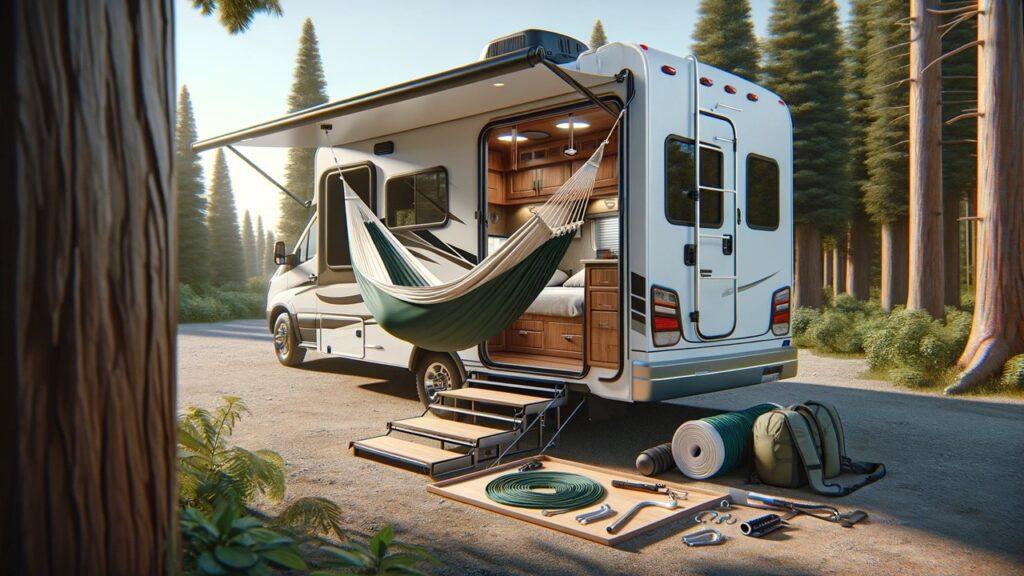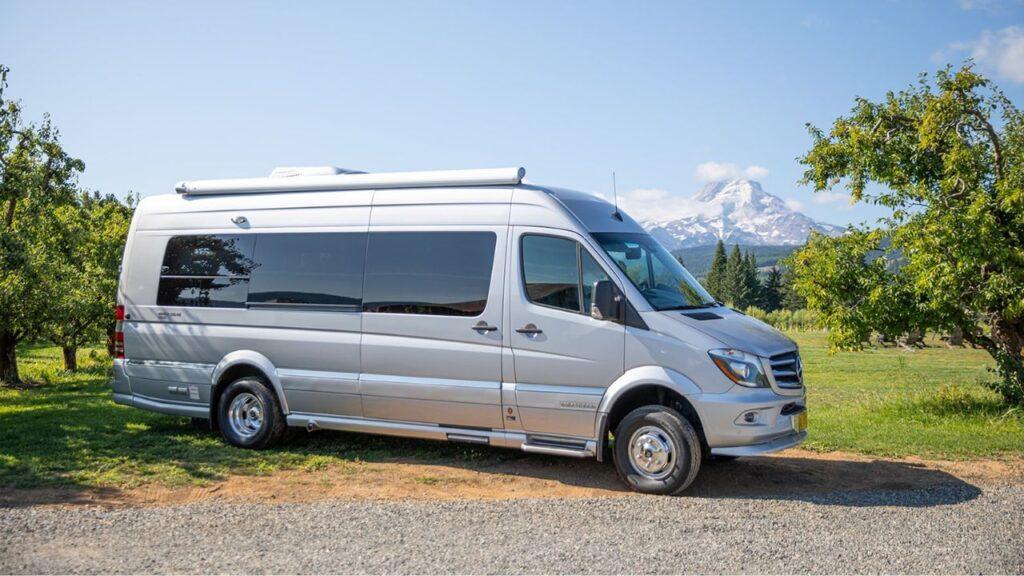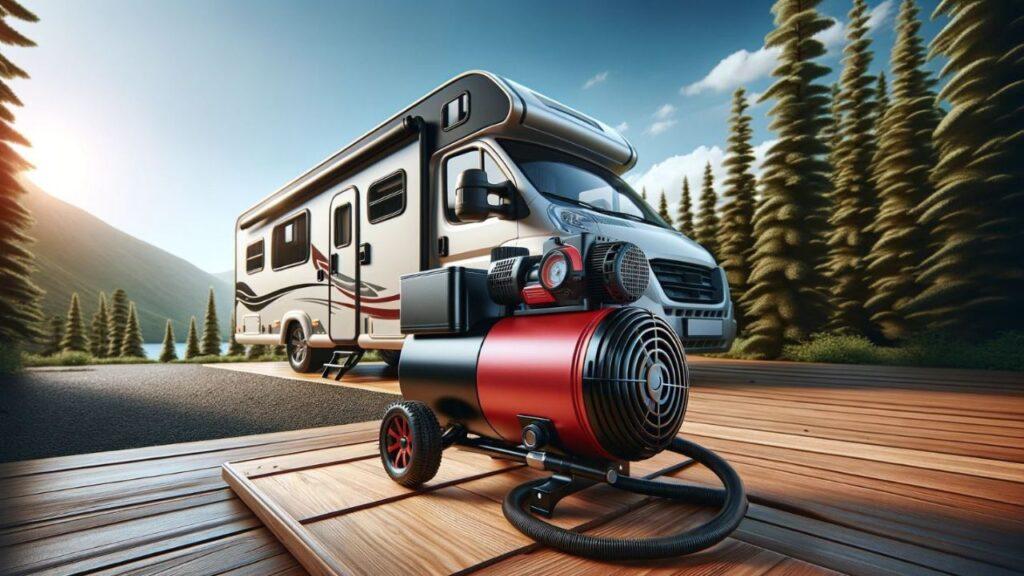The best campervan tires for van life offer durability, strong traction, and load support for long road trips and off-grid terrain. Whether you’re driving on highways, gravel, or wet roads, quality van tires ensure safety, stability, and fuel efficiency. We’ve compared top-rated all-season, all-terrain, run-flat, all-weather, and touring campervan tires based on size, tread design, road noise, and real-world mileage to help you pick the best fit for your van build and travel style.
We’re reader-supported. When you buy through links on our site, we may earn an affiliate commission. As an Amazon Associate, we earn from qualifying purchases, at no extra cost to you.
Best Campervan and RV Tires For Van Life: Our Top 5 Picks
- All-Terrain Tires (Overall Option): Lexani Terrain Beast AT
- All-Season Tires (Budget-Friendly Option): Summit Ultramax HP
- Run-Flat Tires (For Emergency Situations): Continental ContiProContact SSR
- All-Weather Tires (Year-Round Versatility): Fullway HP108
- Touring Tires (For Comfort and Longevity): Goodyear Eagle
1. All-Terrain Tires (Overall Option): Lexani Terrain Beast AT

Key Specifications
- Brand: Lexani
- Size: LT245/75R16
- Load Capacity: 1609 pounds
- Tread Depth: 16 inches
- Rim Size: 16 inches
When we got our hands on the Lexani Terrain Beast AT, we were itching to see how they’d hold up to our campervan adventures. First off, these tires didn’t disappoint. The deep grooves are no joke—they cut through muddy trails and wet roads like a pro. We hit some seriously slick spots after a rainstorm, and these tires held on tight. And for highway driving? Quiet. Smooth. None of that constant hum you sometimes get with all-terrain tires. It made those long stretches so much more bearable.
We also put them to the test on our off-grid detours—gravel, dirt, sand, you name it. They stayed solid and didn’t feel wobbly or unbalanced, even on the rougher spots. One thing we noticed was how the tread stayed in great shape, even after days of testing. No weird wear patterns or anything, which is a huge win when you’re living on the road. Honestly, if you need a tire that can handle both everyday driving and rugged adventures, this one feels like the proper pick.
Pros
- Excellent grip on wet and muddy terrains
- Quiet and smooth ride on highways
- Durable tread that holds up over time
- Balanced and reliable for varied conditions
Cons
- Slightly heavy to mount
- Can feel firm on perfectly smooth roads
2. All-Season Tires (Budget-Friendly Option): Summit Ultramax HP

Key Specifications
- Brand: Summit
- Size: 235/40R19
- Load Capacity: 1565 pounds
- Tread Depth: 10/32nds
- Rim Size: 19 inches
From our standpoint, the Summit Ultramax HP proved itself as a practical, budget-friendly option during our test runs. In our opinion, these tires handle paved roads with ease. Our journey started on a long stretch of highway where the first thing we noticed was how quiet the ride felt. No annoying vibrations, no constant hum—just a smooth drive. The solid center rib kept things steady even when we picked up speed, which is a big plus when you’re hauling gear in a campervan.
From our perspective, wet roads were where these tires truly surprised us. We hit a stretch of rain-soaked asphalt, and the high-angle tread grooves did a great job clearing water, reducing any slipping or sliding. Fuel efficiency also stood out, likely thanks to the silica-based compound that seemed to keep the tires rolling smoothly without unnecessary resistance. While they’re not meant for off-road adventures, we’d say they’re a smart, reliable choice for anyone sticking to the roads.
Pros
- Quiet, smooth highway performance
- Stable handling at higher speeds
- Handles wet conditions confidently
- Helps improve fuel efficiency
Cons
- Not fully suited for off-road adventures
- Limited for winter conditions
3. Run-Flat Tires (For Emergency Situations): Continental ContiProContact SSR

Key Specifications
- Brand: Continental
- Seasons: Year-round
- Size: 225/50R17
- Load Capacity: 1609 pounds
- Tread Depth: 10/32nds
- Rim Size: 17 inches
From our standpoint, testing the Continental ContiProContact SSR was a real-life adventure. We wanted to see how these run-flat tires handled the unexpected, so we set off on a mix of city streets, highways, and some lightly snow-covered roads. Halfway through the trip, we purposely punctured one of the tires to see if it would hold up. To our surprise, the tire gave us enough mileage to safely reach a repair shop without a hitch. The drive stayed stable, and we didn’t feel that panicked wobble you might expect with a flat. That reliability stood out to us immediately.
On the rest of our journey, the tires delivered a comfortable, quiet ride. We tested them during a rainstorm, and the grip was impressive, keeping us steady even on slick roads. From our perspective, the reduced road noise and smooth handling made the ride feel relaxed, which matters when you’re on the road for hours. Overall, these tires brought a sense of safety and practicality to our van life setup, especially for emergencies.
Pros
- Reliable run-flat feature during punctures
- Smooth and quiet driving experience
- Excellent grip on wet and dry roads
- Great for year-round use
Cons
- Slightly heavier than standard tires
- Feels a bit firm on rough patches
4. All-Weather Tires (Year-Round Versatility): Fullway HP108

Key Specifications
- Brand: Fullway
- Seasons: Year-round
- Size: 205/55R16
- Load Capacity: 1356 pounds
- Tread Depth: 10.1 millimeters
- Rim Size: 16 inches
From our perspective, the Fullway HP108 is a solid option for campervan users who need reliable performance all year long. We took these tires out for a spin on a mix of roads, from busy highways to winding backroads. One thing that really stood out during our tests was how well they handled transitions between weather conditions. Whether it was dry pavement, light rain, or a chilly morning frost, these tires felt steady and dependable throughout.
Our journey included both city stops and longer highway stretches, and in our opinion, these tires delivered a quiet and smooth ride. The asymmetrical tread design seemed to hold up well, giving us good grip and control even during sharper turns. The fact that they didn’t show uneven wear after a full day of mixed driving gave us extra confidence in their durability. For anyone looking for year-round versatility, we’d say these are a proper pick.
Pros
- Dependable grip in changing weather
- Smooth and quiet ride on highways
- Durable tread for longer life
- Handles sharp turns confidently
Cons
- Limited for heavier loads
- Not ideal for extreme winter conditions
5. Touring Tires (For Comfort and Longevity): Goodyear Eagle

Key Specifications
- Brand: Goodyear
- Seasons: Non-Winter
- Size: 285/45R22
- Load Capacity: 1700 pounds
- Tread Depth: 10/32nds
- Rim Size: 22 inches
From our standpoint, the Goodyear Eagle Touring tires deliver exactly what you’d want for a comfortable, long-lasting ride. During our tests, we took these tires on highways, suburban streets, and even some wet roads to see how they handled. The first thing we noticed was the ride’s smoothness—almost like gliding on the pavement. The optimized tread design seemed to absorb most of the road’s imperfections, which made the journey far less tiring.
In our opinion, these tires shine when it comes to grip and control. The biting edges and symmetrical tread pattern worked wonders during wet conditions, and they stayed steady through sharp turns and sudden stops. Even after a full day of driving, there was no sign of uneven wear, thanks to the durable construction. For van lifers like us, who rely on their tires for both comfort and reliability, these feel like a proper, long-term solution.
Pros
- Smooth and quiet ride
- Reliable grip in various conditions
- Durable tread for extended life
- Handles wet roads confidently
Cons
- Not suited for heavy off-roading
- May feel firm on extremely rough terrain
Key Factors to Consider When Choosing Tires for Van Life
Finding the best tires for van life isn’t just about getting from point A to point B—it’s about doing it safely, comfortably, and without unexpected hiccups. Let’s break it down into the key aspects you need to think about.
Load Capacity (Weight Ratings)
Your van isn’t just carrying passengers; it’s likely loaded with gear, appliances, and maybe even solar panels. That’s where load ratings come in. Tires are labeled with load index numbers, which indicate how much weight they can handle.
- Look for LT (Light Truck) tires if your campervan or RV is loaded with gear or converted for full-time living. These tires are built to handle extra weight and resist wear.
- If your setup is lighter, P-metric (Passenger) tires might work, but they may not last as long under heavy loads.
Checking your vehicle’s Gross Vehicle Weight Rating (GVWR) can help you match the right tire to your needs.
Tread Type
The type of tread on your tires determines where they’ll perform best. Are you sticking to highways, or do you crave off-road adventures?
- All-Terrain Tires: Great for mixed surfaces, offering solid grip on gravel, dirt, and pavement. Perfect if you alternate between city streets and campsites.
- Mud-Terrain Tires: For those who love boondocking or tackling muddy trails. They have aggressive treads but can be noisy and less efficient on highways.
- All-Season Tires: Versatile and reliable for year-round use, especially for urban and highway driving with occasional light off-roading.
Durability and Longevity
Let’s face it—no one wants to replace tires in the middle of a trip. Durable tires with strong sidewalls and puncture resistance are a must for van lifers.
- Look for features like reinforced sidewalls to prevent blowouts.
- Check the mileage warranty; tires with warranties of 50,000 miles or more are usually a good bet.
Weather Conditions and Climate Suitability
Your tire needs change depending on where you travel.
- In snowy regions, look for three-peak mountain snowflake-rated tires or invest in dedicated winter tires.
- For hot climates, heat-resistant tires with robust rubber compounds will hold up better on long drives.
Ride Comfort and Noise Levels
If you’re clocking hours on the highway, comfort matters. While all-terrain and mud-terrain tires are great for off-road adventures, they can be noisier and less smooth.
For long-distance road trips, highway or all-season tires are often a better choice since they prioritize low road noise and a softer ride.
These tires are designed for a quieter, more comfortable experience, making them ideal for extended travel where smooth handling and reduced vibration can make all the difference.
Why Choosing Good Tires for Van Life Matters
The best tires for van life are your ticket to safety, fuel efficiency, and hassle-free travel. The right tires ensure better grip, longer wear, and improved comfort on all kinds of terrain, from paved highways to rocky trails.
Think of your tires as the backbone of your van life experience. Subpar choices can lead to uneven wear, poor fuel efficiency, and even safety risks in extreme conditions. Good tires, on the other hand, give you the confidence to explore more without worrying about the road ahead.
And it’s not just about getting to your destination—it’s about how you get there. A smooth, quiet ride makes the journey just as enjoyable as the destination.
Tire Maintenance Tips for Van Lifers
Tire maintenance is as important as choosing the right tires. A little effort can save you from costly replacements or breakdowns on the road.
- Check Tire Pressure Weekly: Use a portable air compressor or gas station pumps to keep pressure within recommended levels.
- Inspect for Wear and Damage: Look for cracks, cuts, or uneven tread wear, which could signal alignment issues.
- Rotate Tires Every 5,000–7,000 Miles: This helps them wear evenly and last longer.
- Balance and Align Regularly: Prevents vibrations and uneven wear, improving both comfort and safety.
- Carry a Spare Tire and Repair Kit: Always be prepared for emergencies, especially in remote areas.
Final Words
Picking the best tires for van life is all about safety, comfort, and reliability. Whether you’re tackling rugged trails or cruising highways, the right tires can keep your journey smooth and stress-free.
If off-road adventures call your name, the Lexani Terrain Beast AT is a solid choice. For budget-friendly highway driving, the Summit Ultramax HP delivers great value. And if emergencies worry you, the Continental ContiProContact SSR offers extra peace of mind with its run-flat design.
Tires are more than just rubber—they’re what keep your van moving and your adventures rolling. So check your tread, keep your pressure right, and hit the road with confidence. Safe travels!
FAQs
Do campervans need special tires?
Campervans often need special tires, especially LT (Light Truck) tires, which are built to handle heavier loads and provide extra durability. Regular passenger car tires may not be strong enough to support the weight of a fully loaded campervan, so it’s important to choose tires with the right load rating and tread type for your travel needs.
What’s the difference between LT and P-metric tires for vans?
LT (Light Truck) tires are built for heavier loads and tougher conditions, making them ideal for campervans or heavily loaded vans. P-metric (Passenger) tires are lighter and best suited for standard vehicles or lightly loaded vans.
How often should I replace my tires?
Tires should typically be replaced every 6–10 years or when the tread depth falls below 2/32 inches. Regular inspections can help you spot issues earlier.
Are all-terrain tires noisy on highways?
Yes, all-terrain tires can be noisier than highway or all-season tires due to their aggressive tread patterns. However, some newer models are designed to minimize road noise.
Can I mix tire types on my van?
It’s not recommended. Mixing tire types can affect handling, braking, and overall safety. Always use the same type and size of tires on all wheels.
What’s the best tire pressure for van life?
The best tire pressure varies by vehicle and tire type. Check your van’s manual or the tire sidewall for recommended PSI and adjust based on your load.

Jack Rivers is a long-time RVer, a husband, and a dad who’s traveled solo and now with his family. He’s learned a lot from years on the road, sometimes the hard way. From quiet mornings parked by the woods to messy evenings with the kids and a busted heater, he’s been through it all. Miles writes to share the real stuff, the small wins, and the lessons that make RV life worth it, no matter who you’re traveling with.







